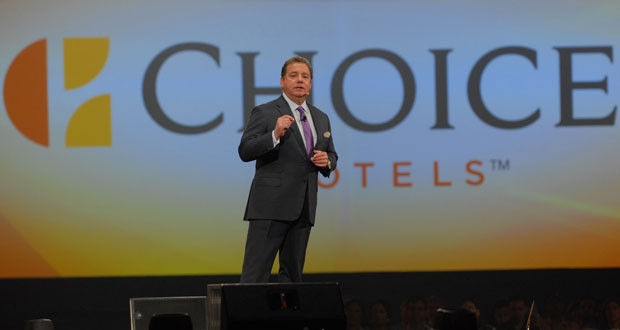April 15, 2016By: David Eisen

Steve Joyce, the CEO of Choice Hotels International, is unapologetically brusque. And it’s exactly what the hospitality industry needs. He says what others rarely would dare say; after all, when you are running a publicly traded company, one small misspeak can cost you. Still, the snappy Joyce is not one to shy away. Thank goodness.
Our partner publication Hotel Management caught up with the former “Undercover Boss” for his thoughts on the Starwood deal (he called the outcome before it happened), OTAs (not a huge fan), Donald Trump (he’s ridiculous—and NOT a hotelier) and how his multi-branded company fits into the overall travel landscape (it’s going strong).
1. Online travel agencies continue to take a huge bite out of the hotel industry, eating into profits via exorbitant commission structures. The industry has taken notice and tried, of late, to push consumers to book direct. What is Choice doing and is there anything that can be done to slow OTAs down?
Joyce: We’ve been doing a push to book direct, and will do more. We, as an industry, are all getting more aggressive, and I think we can have an impact on the OTAs. OTAs have convinced the American public that there are lower rates on their sites—which isn’t true. When you start reaching the majority of your most important customers and create an environment where you are the only place to get the best rate and value, it begins to work. It will put more balance in the relationship with OTAs and drive better pricing. In regard to OTAs specifically, if you charge a fair [commission], I have no issues, but you aren’t charging a fair price and you aren’t worth it. They have been getting it because the industry has not gotten its act together.
2. How has your loyalty program, Choice Privileges, been upgraded to not only give customers more value, but also persuade them to engage directly with Choice?
Joyce: We are doing work around making sure we can deliver for our properties all week, particularly mid-week, and particularly at our Comfort hotels, which is a big charge for us. We revamped Choice Privileges, which is at 25-million-members strong, and made it geared more toward Millennial and business travelers, where members are now getting something instantly when they join. Special rates are also available now and when inventory is available at lower rates, we let people know. We also have a points system similar to an Amazon or Starbucks.
[embedded content]
3. Note: Question posed while deal for Starwood was still up in the air. What’s your take on the Starwood deal?
Joyce: First, we are always looking to grow and, in fact, inquired about Starwood ourselves. Here was our deal: They are four times our size. Our deal was: ‘Technically, you [Starwood] has to buy us, but then we will run you. You need us, which is true.’ It just wasn’t well received by their board.
Blackstone’s deal [flipping the Strategic portfolio to Anbang and making a quick $500 million] taught us what the risk premim is for doing business with the Chinese. The Chinese have a history of not always following through. You want assurance of closing. The risk reward has to be significant to let Marriott walk away. You know Marriott will close, Anbang may not. That’s the dilemma.
4. As we move forward through 2016 and into 2017, do you envision more consolidation within the industry?
Joyce: Scale has never been more important. For us, in that second tier, with 500,000-plus rooms, there is not a big difference between 500,000 and 600,000 rooms. But Marriott will now be at plus 1 million rooms. You can drive economies of scale that will be remarkable and weather the distribution environment in a way where they will have more leverage.
We would love to add to our portfolio. We at look at everything. You will start seeing more discussion between larger organizations, sometimes about mergers, but more about pulling together in alignment for certain purposes, such as distribution and technology. That’s where we are going. Technology isn’t proprietary to us, we will share with the industry, like we’ve done with SkyTouch [a PMS platform Choice has an equity stake in]. This is unlike the past when there were high walls. There will still be competition, but on less critical things that won’t necessarily sell you another unit.
5. Shifting to politics, what happens if Donald Trump becomes president?
Joyce: There are several dangers to Trump. He will send our employees home, even those who are now working here legally. Not sure who he thinks will work in hotels, and not sure why he thinks that’s not the American dream. He’s not a hotel guy; he’s a name that goes on a building. His view of the rest of the world is not what we need. Any restraint of trade is a mistake. Where goods are produced the cheapest is a good place to get them from. I don’t think he stands a chance of winning [the general election]. I know many people who may not like Hillary but will vote for her over him.
Caught on camera .@HHConference, .@ChoiceHotels CEO Steve Joyce tells me something I don’t know. pic.twitter.com/vgVBjDUaTJ
— David Eisen (@DavidEisen3) March 23, 2016
6. What’s new with Choice?
Joyce: A lot. We’ve had 19 consecutive months of increased RevPAR. We are doing some multi-unit deals in Europe, in the likes of Poland and Germany. It’s starting to pay off. Stateside, by the end of the year, we will have taken out 600 Comforts from the system. There are new opportunities to rebuild with new ones. Our new Comfort Suites are opening really strong. We did 85 new constructs last year and demand is growing for the product. There are new markets we want to get in. Some of the Comforts have stayed part of the system, others converted into a Quality or Econo Lodge, if it fits. Quality got a lot of Comforts last year. With Quality, your PIP is lighter; it’s less.
We also partnered with Paul Whetsell [former Loews Hotels CEO] in a JV to buy properties and convert them to Cambrias. We will use his expertise. It will be a short-term investment, where we will buy, convert, then flip to an institutional partner. We signed 26 Cambria deals last year and will have 31 under construction in 2017—if we are lucky. The numbers are expanding rapidly.
What do you think of this $type?










